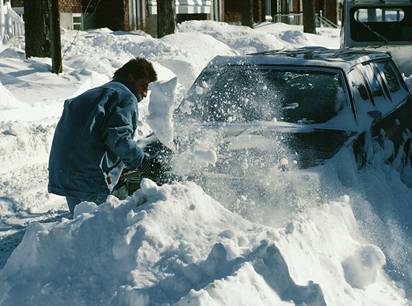Winter Weather Preparedness
January 23, 2014
 Winter storms and severe cold weather pose significant health risks, particularly for people with special healthcare needs and chronic medical problems. Esther Chernak, MD, MPH, FACP, Director of the Center for Public Health Readiness and Communication at the Drexel University School of Public Health, offers the following advice for getting through a rough winter.
Winter storms and severe cold weather pose significant health risks, particularly for people with special healthcare needs and chronic medical problems. Esther Chernak, MD, MPH, FACP, Director of the Center for Public Health Readiness and Communication at the Drexel University School of Public Health, offers the following advice for getting through a rough winter.
Advice from Dr. Chernak:
- Be careful about travel. Pay attention to weather warnings from emergency management agencies and from the National Weather Service. Avoid traveling in low-visibility conditions and on icy roads.
- Keep emergency supplies in your vehicle, including a blanket, flashlight, ice scraper for windshield, and shovel. Keep gas tank full, and make sure that there is sufficient windshield wiper fluid (replace with wintertime mixture).
- Plan for utility outages:
- Be able to “shelter- in- place” for at least 3 days and up to one week. Have water (1 gallon per person per day), extra food, flashlight, battery-operated radio, extra batteries. Use flashlights instead of candles.
- Make sure you have at least one week’s supply of medications on hand, as well as extra supplies of medical equipment.
- Heat your home safely. Don’t place space heater near things that can catch on fire. Don’t use kerosene or oil-burning heaters in enclosed spaces, or burn paper in fire places. Keep the chimney clean.
- Make sure your home has working smoke detectors and carbon monoxide detectors.
- Know the symptoms of carbon monoxide poisoning: headache, dizziness, nausea, chest pain.
- If you rely on electricity to power assistive technology, contact the local utility company so that you can be placed on a priority list for restoration. Keep extra batteries on hand and if you plan to use a generator make sure you know how to use it safely.
- Some people are at greater risk for hypothermia. The elderly, very young children, individuals with intellectual or developmental disabilities, homeless, substance abusers are among the most likely to develop hypothermia when exposed to cold weather for prolonged periods. Public health and healthcare professionals should make special efforts to reach those people and work with community partners to facilitate access to shelters and minimize time spent outdoors.
- If you have special medical or healthcare needs, make sure you take the time to plan, assemble a ‘go-kit’ of important supplies, including medications and other necessary equipment. Make sure you have a support network of key friends, families, and caregivers who know your needs and who can help you in an emergency. Keep an up-to-date list of these people so you can contact them easily, and so others can reach them should you not be able to contact them yourself.
- If you are a healthcare, public health, or social service professional, take the time to make sure your patients or clients who are at risk for winter-related problems have plans in place to avoid them.
- If you have a chronic medical condition, talk to your doctor about exerting yourself in cold weather. Dress appropriately when shoveling snow, pace yourself, and take care to avoid injuries from improper lifting.